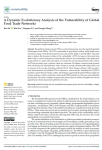Xu H., Niu N., Li D., Wang C. (2024). A dynamic evolutionary analysis of the vulnerability of global food trade networks. Sustainability, 02/05/2024, vol. 16, n. 10, p. 3998.
https://doi.org/10.3390/su16103998
https://doi.org/10.3390/su16103998
| Titre : | A dynamic evolutionary analysis of the vulnerability of global food trade networks (2024) |
| Auteurs : | H. Xu ; N. Niu ; D. Li ; C. Wang |
| Type de document : | Article |
| Dans : | Sustainability (vol. 16, n. 10, May 2024) |
| Article en page(s) : | p. 3998 |
| Langues : | Anglais |
| Langues du résumé : | Anglais |
| Catégories : |
Catégories principales 11 - COMMERCE ; 11.3 - Commerce Extérieur et InternationalThésaurus IAMM COMMERCE AGRICOLE ; COMMERCE INTERNATIONAL ; RESEAU ; VULNERABILITE |
| Résumé : | The global food trade network (FTN) is a critical infrastructure for achieving the Sustainable Development Goals (SDGs). The FTN’s vulnerability to geopolitical conflicts, public health crises, and climate change events directly impacts food security and the ability to meet the SDGs. This study aims to analyze the dynamic evolution of the vulnerability of FTN, focusing on the period from 2000 to 2022, to aim for strategies for enhancing the resilience and sustainability of the global food system. Based on complex network analysis, we examine the structural characteristics and evolution of FTN for four major crops: soybeans, wheat, rice, and maize. We identify a trend towards increased network density and regionalization, with a decline in average shortest path length (ASPL) and an increase in the average clustering coefficient (ACC). These changes indicate a shift towards a more interconnected and resilient FTN in response to various shocks, including the COVID-19 pandemic and the Russia–Ukraine conflict. The findings suggest that the global FTN has adapted to increase resilience, which is essential for achieving the SDGs related to food security and sustainable development. The study’s insights can guide policy interventions to further strengthen the network against future shocks and promote global food security. |
| Cote : | En ligne |
| URL / DOI : | https://doi.org/10.3390/su16103998 |







